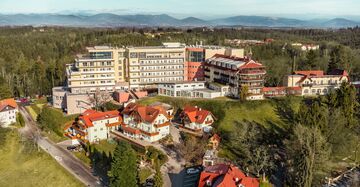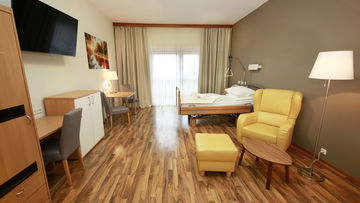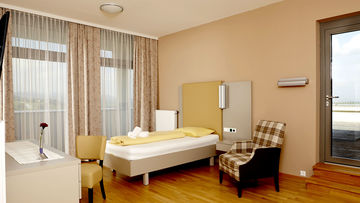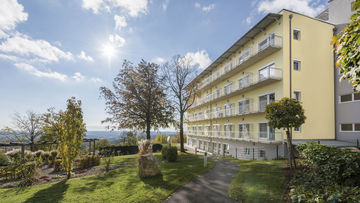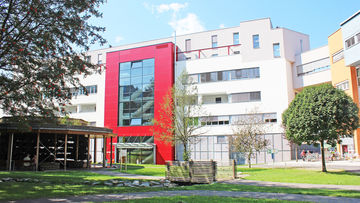REHABILITATION
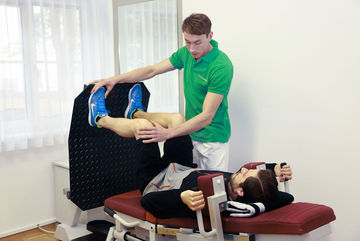
Orthopaedic rehabilitation
In diseases of the musculoskeletal system, there is usually severe pain and restricted range of motion. Often, the spine, especially in the lumbar and neck area, and the large joints (hip, knee, shoulder) are affected. Patients may be assigned to orthopaedic rehabilitation after surgery, or also to achieve pain relief without having surgery. The rehabilitation goals are pain relief, improvement of joint mobility and muscle strengthening, as well as reducing the need of using auxiliary aids such as a walker or crutches. The duration of the inpatient stay is three weeks. The costs are covered by the competent health insurance insitution once an application has been submitted by a general practitioner, specialist or a hospital doctor. Depending on the income situation (as well as in the hospital), the patient is surcharged a daily cost contribution.
Neurological rehabilitation
Diseases of the central (brain and spinal cord) or peripheral nervous system can cause various and lengthy impairments of bodily functions. In the foreground are paralyzes, sensibility disorders, restrictions regarding language, sight, swallowing as well as thinking skills. In the course of rehabilitation, these impaired functions are re-learned or improved in order to enable our patients to live as independently as possible to increase their quality of life after rehabilitation. The most common diseases treated during a neurological rehabilitation are strokes, multiple sclerosis, Parkinson's disease, neuropathies, conditions following head injuries or operations, spinal operations, cross-sections, damages to individual nerves and the like. The duration of the inpatient stay is usually set for four weeks. However, medically indicated extensions are possible. The costs are covered by the competent health insurance insitution once an application has been submitted by a general practitioner, specialist or hospital doctor. Depending on the income situation, patients (as well as in the hospital) the patient is surcharged a daily cost contribution.


Psychiatric rehabilitation
Psychiatric and psychosomatic illnesses are an increasing social problem. For those affected, such diseases can mean personal suffering and often lead to dramatic deteriorations concerning the quality of life. Furthermore, they may have a negative impact on the persons professional situation. Conversely, changes in occupational activities, including job loss, often have a negative effect on the mental state of a person as our identity, self-esteem and social well-being are stabilized by recognition in our professional life. Hence, the main focus of psychiatric rehabilitation lies on this mutual influence of mental health and employment. However, it is important to bear in mind that the chances for a vocational reintegration depend not only on the qualification and mental stability of the individual worker, but also on economic factors within the labor market.

Quality management
"Competence and quality at all times" is our motto - a corporate philosophy lived by SANLAS Holding and its facilities. Since 2005, SANLAS Holding is committed to meeting the extensive quality requirements of the international QM standard EN ISO 9001 as amended in their operations and processes, aiming at a continuous reviewing and improving of the quality of services.



